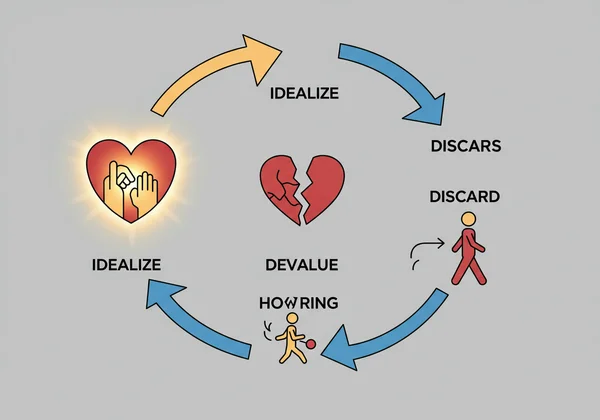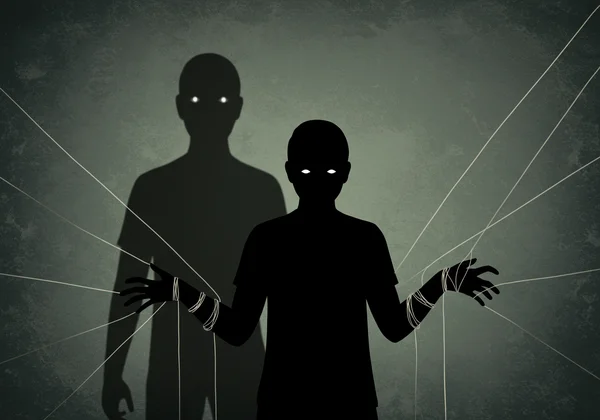我正在经历自恋型虐待吗?参加我们的免费 NPD 测试
November 11, 2025 | By Clara Jennings
在一段关系中,你是否感到自己经常被批评、被操纵,或者你的现实感正在受到质疑?你可能正在经历一种 极具破坏性的情感伤害模式 ,即 自恋型虐待 。你是否正在努力理解一段令人困惑的关系?本指南将定义自恋型虐待,解释其阴险的循环,并帮助你识别其迹象。我们将探讨它对你的幸福感造成的深刻而持久的影响,验证你的经历,并提供一条通往治愈的道路。获得清晰的认知是第一步,我们的 免费筛查工具 可以提供帮助。
什么是自恋型虐待?理解其动态以及我们的 NPD 测试如何提供帮助
自恋型虐待是一种由具有高度自恋特质的人施加的情感和心理伤害。它是一种 根深蒂固的行为模式 ,旨在控制、支配和贬低他人,以满足施虐者对钦佩和权力的需求。这不仅仅是意见不合;它是一种对你自我意识的系统性侵蚀。这种虐待通常是微妙的,使受害者难以识别。一个有效的 npd test 可以帮助你识别这些微妙但具有破坏性的模式。

不仅仅是“有毒”:区分自恋型虐待
虽然许多关系可能“有毒”,但自恋型虐待是独特的。它源于一种以缺乏同情心、夸大的自我重要感和永不满足的寻求认同为核心的 心理特质 。这些行为并非偶然,而是旨在维持优越感的精心策划的策略,使这种经历异常令人困惑。
核心动机:控制、权力与自尊调节
理解虐待背后的动机至关重要。一个具有强烈自恋特质的人通常拥有非常脆弱的自我。为了保护这个脆弱的自我,他们必须控制外部环境,包括其中的人。通过操纵和贬低你,他们 人为地提升自我价值感 。你的痛苦成为调节他们不稳定自尊的工具。使用在线 npd test 可以帮助阐明你所看到行为背后的这些核心动机。
自恋型虐待循环:理想化、贬低、抛弃
这种形式的虐待很少以消极开始。它遵循一个可预测的恶性循环, 让受害者在困惑和对关系的希望之间难以自拔 。识别这种模式是挣脱束缚的有力一步,一个 narcissist test 可以帮助你识别其阶段。

阶段 1:理想化——爱情轰炸和强烈魅力
这个循环始于“爱情轰炸”,一个强烈示爱的阶段。自恋者将你捧上神坛,用赞美、礼物和爱的宣言来轰炸你。他们会模仿你的兴趣,让你觉得找到了灵魂伴侣。这个阶段旨在 让你深陷其中 并放松警惕。
阶段 2:贬低——批评、控制和煤气灯效应
一旦你投入其中,面具就会滑落。理想化转变为贬低。赞美被批评和轻蔑取代。煤气灯效应等操纵性策略浮现,让你 开始质疑自己的认知和判断力 。他们让你觉得自己才是问题所在。一个 free npd test 通常会包含旨在发现这些特定策略的问题。
3 阶段:抛弃——突然的遗弃和情感上的毁灭
当自恋者不再获得足够的钦佩(自恋供给),或者如果你挑战他们的控制时,他们就会抛弃你。这通常是突然而冷酷的, 毫不留情,不留任何解释或交代 。被抛弃的受害者会感到震惊、毫无价值和深深的被遗弃感。
“吸尘”——将你拉回循环:用 NPD 筛查工具识别
一段时间后,自恋者可能会试图 “吸尘”(hoovering,即试图将你重新拉回关系) 你回来。他们可能会带着道歉、改变的承诺或理想化阶段的回忆再次出现。这并非真正的和解,而是一种重新获得供给的策略。理解这些模式是关键,一个 test for NPD 可能会对该人的行为提供重要的见解。一个 NPD test 提供了一个客观的视角来审视这些操纵性尝试。
自恋型虐待的迹象:识别危险信号
当你身处其中时,识别这些迹象可能很困难。这些危险信号通常被伪装起来,但它们共同描绘出一幅清晰的操纵画面。一个好的 narcissist test 会询问这些具体的行为。

情感操纵:煤气灯效应(让你怀疑自己的现实感)、推卸责任和混乱的言语
煤气灯效应是一种典型的策略,施虐者否认你的现实。推卸责任是他们拒绝承担责任,总是让你成为过错方。“混乱的言语”指的是循环、无意义的争论,让你感到精疲力尽和困惑。
控制与孤立:破坏你的人际关系和独立性
施虐者会试图将你与你的支持系统隔离开来。他们可能会批评你所爱的人,制造矛盾,或者让你难以见到他们。这种孤立使你更加依赖施虐者,从而让他们获得更大的控制权。
不断的批评、贬低和羞辱性言论
你做的任何事情都永远不够好。施虐者不断挑剔你的外表、智力、事业和选择。这些言论旨在削弱你的自尊,让你感到自己毫无价值。
缺乏同情心和无视你的感受
自恋的核心特征是深刻的缺乏同情心。你的感受被忽视、否定,或被视为不便。当你受伤时,他们可能会变得愤怒或不屑一顾。这是任何 npd test 的重点关注领域。
自恋型虐待对受害者的持久影响
影响不会随着关系的结束而终止。心理创伤可能是深刻而持久的。验证这些影响是治愈的关键部分,而一个 free npd test 可以是承认情况严重性的第一步。
复杂性创伤后应激障碍 (Complex Post-Traumatic Stress Disorder, C-PTSD)、慢性焦虑和抑郁
长期暴露于这种创伤通常会导致 复杂性创伤后应激障碍 (Complex Post-Traumatic Stress Disorder, C-PTSD) 。幸存者可能会经历闪回、过度警觉和强烈焦虑。慢性抑郁和绝望是常见的后果。
被严重侵蚀的自我价值感、身份认同混乱和自我怀疑
在被反复告知自己有缺陷后,你会信以为真。受害者通常会遭受 被严重侵蚀的自我价值感 和混乱的身份认同。你可能不再知道自己是谁,也不再相信自己的判断。
严重的信任危机和难以建立健康的新关系
深度的背叛使得信任他人变得异常困难。幸存者可能会害怕亲密关系,或者发现自己被吸引到类似不健康的动态中。重建对自己判断的信任是一个重大的挑战。学习 check for NPD 特质可能是这个过程中的一个赋能部分。
从自恋型虐待中恢复:迈向康复的步骤
治愈是一段旅程,而非终点,但它完全是可能的。它需要勇气、耐心和将自己放在首位的承诺。你可以重拾生活,建立一个没有虐待的未来。

承认你的经历并接纳你的感受
第一步是承认你所经历的是真实的,而不是你的错。你的痛苦、愤怒和困惑是有效的感受。停止为施虐者的行为找借口,开始肯定你的现实。许多人发现 NPD test 的结果有助于提供这种初步的肯定。
设定界限、寻求支持并将自我关怀放在首位
实施坚定的界限,特别是“无接触”规则,对你的康复至关重要。与值得信赖的朋友和家人重新建立联系,他们可以提供支持。 将自我关怀放在首位 的活动来滋养你身心和精神。
为什么专业治疗是长期的心理疗愈关键
与一位在自恋型虐待方面有经验的治疗师合作可以改变你的生活。专业人士可以提供工具来处理创伤,重建你的自尊,并制定建立健康关系的策略。
探寻问题的根源:参加我们的免费 NPD 测试
如果你正在努力理解一段令人困惑和痛苦的关系,使用像我们的 npd test 这样的工具可以提供巨大的清晰度。虽然它不是诊断,但筛查工具可以帮助识别与自恋型人格障碍一致的模式。我们鼓励你 参加我们的 NPD 测试 以获得有价值的见解。
展望未来:你的治愈与清晰之路
识别自恋型虐待是重拾生活的第一步,也是勇敢的一步。虽然这段旅程可能充满挑战,但了解虐待循环、迹象及其影响会赋予你挣脱束缚的力量。请记住,你并不孤单,你的经历是真实的。如果你怀疑生活中的某人表现出自恋特质,获得清晰的认知至关重要。今天就通过浏览我们网站上的资源和 free npd test 开启你的清晰认知之旅 吧。
关于自恋型虐待和 NPD 的常见问题
NPD 的 9 个迹象是什么?
DSM-5 列出了自恋型人格障碍的九项标准。个体必须持续表现出至少五项才能获得正式诊断。这些包括:夸大的自我重要感、沉迷于无限成功或权力的幻想、相信自己“与众不同”、需要过度的赞美、 认为自己理应获得特殊待遇 、人际剥削行为、缺乏同情心、嫉妒他人以及傲慢的行为。一个 npd test 被设计用于筛查这些指标。
我如何判断我的伴侣是否患有 NPD?
你无法诊断你的伴侣,因为正式诊断需要合格的心理健康专业人士。然而,你可以识别模式。如果你的伴侣持续表现出九个迹象中的许多,展现出理想化-贬低-抛弃的循环,并使用操纵性策略,这是一个 明显的警示信号 。 我们的免费 NPD 测试 可以帮助你筛查这些特质,并对你观察到的行为获得更清晰的视角。
自恋者知道自己是自恋者吗?
这很复杂。大多数具有高度自恋特质的个体缺乏自我意识,无法认识到自己的行为有问题。他们通常认为自己是优越的,并且他们的行为是正当的。有些人可能意识到自己具有操纵性,但将其视为一种力量的标志。真正的自我反省很少见,因为它威胁到他们 膨胀的自我形象 。
如何在心理上放下自恋者?
在心理上放下,意味着接受你所爱上的那个理想化的人从未真正存在过。它需要 为失去的理想化形象而哀悼 ,练习彻底接受他们的行为,并将你的精力集中在自己身上。正念、写日记和治疗等技巧都是有效的。这是一个将你的自我价值从他们的认可中分离出来,并重新掌控自己叙事的过程。